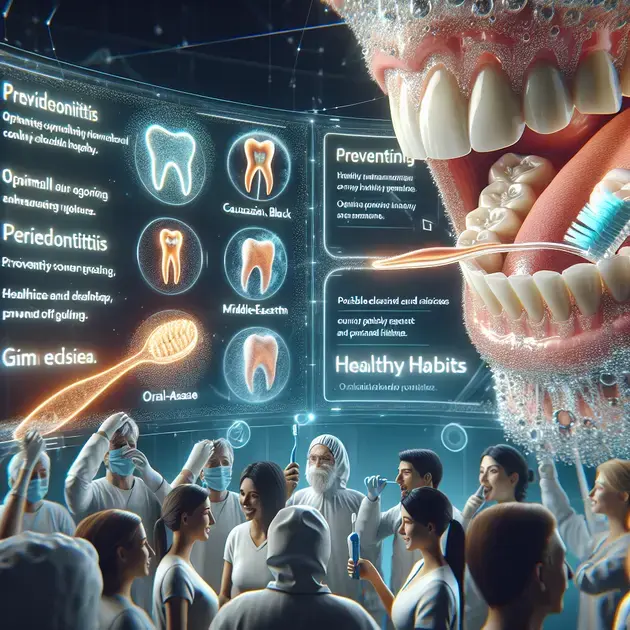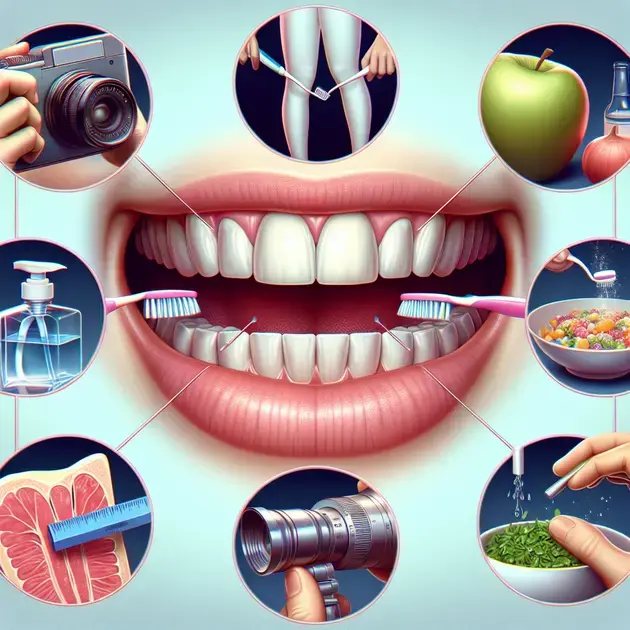When it comes to treating periodontitis, finding the most effective medication is crucial for managing this condition. In this comprehensive guide, we will explore the various options available for combating periodontitis and improving oral health.
Recent studies have shown that a combination of antibiotics and professional dental cleanings can significantly reduce the symptoms of periodontitis. By following the recommendations outlined in this guide, you can take proactive steps towards achieving healthier gums and a brighter smile.

Effective Medication Options for Periodontitis Relief
Periodontitis is a severe oral health condition that requires effective medication options for relief. One such medication is Chlorhexidine mouthwash, which can help reduce plaque and inflammation in the gums. To use this medication, simply rinse your mouth with it twice a day after brushing your teeth. You can find Chlorhexidine mouthwash at most pharmacies or online retailers like Amazon.
Another effective medication for periodontitis relief is prescription-strength fluoride toothpaste. This toothpaste can help strengthen tooth enamel and reduce the risk of further gum disease. To obtain prescription-strength fluoride toothpaste, consult with your dentist who can prescribe it for you.
For more severe cases of periodontitis, your dentist may recommend antibiotics such as doxycycline. These antibiotics can help fight the bacteria causing the gum disease and promote healing. You can get a prescription for antibiotics from your dentist or primary care physician.
In addition to medications, incorporating a good oral hygiene routine into your daily habits is crucial for periodontitis relief. Make sure to brush your teeth twice a day, floss daily, and use an antiseptic mouthwash to help control plaque and bacteria. You can find quality dental products at your local pharmacy or online stores like Target.
Remember to follow your dentist’s recommendations for medication options and maintain good oral hygiene practices to effectively combat periodontitis and relieve symptoms.
Understanding the Role of Antibiotics in Treating Periodontitis
Antibiotics play a crucial role in treating periodontitis by targeting the bacteria that cause gum disease. One common antibiotic prescribed for periodontitis is amoxicillin, which helps eliminate harmful bacteria in the mouth. To take amoxicillin or any other antibiotic, make sure to follow your dentist’s instructions and complete the full course of treatment.
Another antibiotic frequently used for periodontitis is metronidazole, which is effective against certain types of bacteria found in the gums. Your dentist may recommend a combination of antibiotics to maximize the treatment’s effectiveness. You can learn more about the role of antibiotics in treating periodontitis on reputable medical websites like Mayo Clinic.
It’s essential to understand that antibiotics are not a standalone treatment for periodontitis and should be used in conjunction with other therapies like deep cleaning procedures and good oral hygiene practices. If you experience any side effects from antibiotics, be sure to contact your dentist immediately.
Always consult with your healthcare provider before starting any antibiotic treatment for periodontitis to ensure the proper diagnosis and dosage for your specific condition.
Tips for Combating Periodontitis and Improving Oral Health
Preventing and managing periodontitis requires a comprehensive approach to improving oral health. One essential tip is to schedule regular dental check-ups and cleanings with your dentist to monitor your gum health and address any issues early on. Look for reputable dental clinics in your area or use online platforms like Zocdoc to find a trusted dentist near you.
Another tip for combating periodontitis is to quit smoking, as tobacco use can worsen gum disease and hinder treatment effectiveness. Seek support from smoking cessation programs or apps like QuitGuide to help you kick the habit and improve your oral health.
Incorporating a balanced diet rich in fruits, vegetables, and lean proteins can also support gum health and overall oral health. Consider using meal planning apps like MyFitnessPal to track your nutrition and ensure you’re getting the essential vitamins and minerals needed for healthy gums.
Lastly, practice stress-reducing activities like yoga, meditation, or deep breathing exercises to manage stress levels, as stress can contribute to inflammation and worsen periodontitis symptoms. Explore mindfulness apps like Headspace or Calm to incorporate relaxation techniques into your daily routine.
By following these tips and implementing a holistic approach to oral health, you can effectively combat periodontitis, improve your gum health, and enhance your overall well-being.

Effective Medication Options for Periodontitis Relief: A Detailed Review
When it comes to managing periodontitis, there are several effective medication options available. These medications can help alleviate symptoms, reduce inflammation, and promote gum health. One key medication that is commonly prescribed for periodontitis relief is antibiotics. These powerful medications target the bacteria that cause gum disease, helping to eliminate the infection and promote healing.
Antibiotics can come in different forms, including pills, mouth rinses, or gels that are applied directly to the gums. They work by killing bacteria and reducing the size of infected pockets in the gums, allowing the tissue to heal. It’s important to follow your dentist or periodontist’s instructions carefully when taking antibiotics to ensure they are effective and do not contribute to antibiotic resistance.
In addition to antibiotics, other medications such as pain relievers and anti-inflammatory drugs may be prescribed to ease discomfort and reduce swelling associated with periodontitis. These medications can help make it easier to maintain good oral hygiene practices and prevent further progression of the disease.
While medications can be helpful in managing periodontitis, they are typically used in conjunction with other treatments such as deep cleanings, scaling and root planing, and good oral hygiene practices. It’s essential to work closely with your dental care team to develop a personalized treatment plan that addresses your individual needs and promotes long-term gum health.
Overall, effective medication options play a vital role in providing relief from periodontitis and promoting gum health. By working with your dental care team and following their recommendations, you can effectively manage the condition and prevent it from progressing further.
Unlocking the Benefits of Antibiotics in Periodontitis Management
Antibiotics play a crucial role in the management of periodontitis by targeting the bacteria that cause gum disease. These medications can help to reduce inflammation, eliminate infection, and promote healing in the gums. When prescribed by a dental professional, antibiotics can be a powerful tool in restoring oral health and preventing the progression of periodontitis.
There are different types of antibiotics that may be used in the treatment of periodontitis, including amoxicillin, doxycycline, and metronidazole. These antibiotics work by either killing bacteria or inhibiting their growth, helping to control the infection and reduce symptoms such as redness, swelling, and bleeding gums.
It’s important to note that antibiotics should always be used in conjunction with other periodontal treatments, such as deep cleanings and good oral hygiene practices. Taking antibiotics alone may not fully resolve the underlying issues causing periodontitis, so it’s essential to follow a comprehensive treatment plan outlined by your dental care provider.
When prescribed antibiotics for periodontitis management, it’s crucial to take them exactly as directed by your dentist or periodontist. Completing the full course of antibiotics is essential to ensure that the infection is fully eradicated and does not return. Failure to finish the prescribed antibiotics can lead to antibiotic resistance, making it more challenging to treat future infections.
In conclusion, antibiotics are a valuable tool in the management of periodontitis, helping to target the underlying cause of gum disease and promote healing in the gums. By working with your dental care team and following their recommendations, you can unlock the benefits of antibiotics in controlling periodontitis and maintaining optimal oral health.
Enhancing Periodontal Health: Practical Tips for Prevention
Maintaining good oral hygiene practices is essential for preventing periodontitis and promoting overall periodontal health. By following a few practical tips and incorporating them into your daily routine, you can help reduce your risk of developing gum disease and keep your gums healthy.
First and foremost, regular brushing and flossing are the foundation of good oral hygiene. Brushing your teeth at least twice a day and flossing once a day helps to remove plaque and bacteria that can lead to gum disease. Using a soft-bristled toothbrush and fluoride toothpaste can help protect your gums and prevent inflammation.
In addition to daily oral care, regular dental check-ups are crucial for detecting and addressing any early signs of gum disease. Your dentist or periodontist can perform a comprehensive exam, including a periodontal evaluation, to assess the health of your gums and identify any areas of concern.
Another important aspect of preventing periodontitis is to avoid smoking and limit alcohol consumption. Smoking is a significant risk factor for gum disease and can hinder the healing process in the gums. By quitting smoking and reducing alcohol intake, you can significantly improve your oral health and reduce your risk of developing periodontitis.
Furthermore, maintaining a healthy diet rich in fruits, vegetables, and lean proteins can support gum health and overall well-being. Foods high in sugar and carbohydrates can contribute to plaque buildup and increase the risk of gum disease, so it’s essential to eat a balanced diet and limit sugary snacks and beverages.
By incorporating these practical tips into your daily routine, you can enhance your periodontal health, prevent periodontitis, and promote healthy gums for years to come. Remember, good oral hygiene practices and regular dental care are key to maintaining optimal gum health and preventing gum disease.
**
Conclusion
**
Effective medication options, such as antibiotics, play a crucial role in managing periodontitis by targeting the bacteria that cause gum disease. These medications help alleviate symptoms, reduce inflammation, and promote gum health, aiding in the elimination of infections and facilitating the healing process. When used in conjunction with other treatments like deep cleanings and scaling, medication can significantly improve the overall condition of the gums.
Antibiotics like amoxicillin, doxycycline, and metronidazole are commonly prescribed to control infections and symptoms associated with periodontitis. It’s vital to follow the precise instructions provided by dental professionals to ensure effective treatment and prevent antibiotic resistance. By completing the full course of antibiotics and incorporating them into a comprehensive treatment plan, patients can unlock the benefits of these medications in managing and preventing the progression of periodontitis.
Furthermore, a proactive approach to oral health is essential in preventing periodontitis. Regular oral hygiene practices, including brushing and flossing, along with routine dental check-ups, can help detect early signs of gum disease and address them promptly. Avoiding risk factors like smoking and excessive alcohol consumption, while maintaining a balanced diet rich in fruits, vegetables, and lean proteins, can significantly reduce the likelihood of developing periodontitis and support overall gum health.



